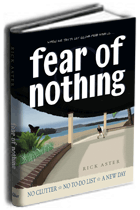March of Trash asks you to take action on clutter every day for a month.
This post is especially for people who are home alone for a period of time and using the time to clear clutter.
Currently, more people than ever are home for weeks at a time. Official policy in dozens of countries is encouraging people to stay home to minimize the impact of a pandemic. Staying home frees up time that can be used to clear clutter, but the unusual circumstance of staying home for weeks on end calls for a few adjustments in approach.
Moderation is the key. In a setting where most hard deadlines have vanished, it can be tempting to think that you can put any given task off until the next day, but decluttering is easiest if you start today. On the other hand, if you have a large block of time open, it can be tempting to imagine that you can go through all of your clutter in a few days. It is better if you go more gradually and work within your physical and emotional limits.
There are two kinds of physical limits to be especially careful of in this situation. If you have been working at a desk for years on end, you cannot suddenly go to moving 40 boxes of stuff in the attic in a day without some physical complaints. Yes, each box is not too heavy, but there is a cumulative effect of lifting and carrying one box after another. Ideally, stop before you get sore. Dust is another physical factor to consider. Anytime you deal with things that have not moved for a long time, you can expect to breathe in some dust. Dust weakens your lungs and causes fatigue, so limit how much dust you take in in one day. Wear a dust mask if appropriate. Some kind of dust protection is almost mandatory if you are visiting an attic for the first time in more than a year. Even wearing a dust mask, you will still inhale some dust and still need to limit your dust exposure.
The emotional limits of clutter clearing are less obvious — until you run into them, that is. Clutter clearing requires a person to make a large number of rational decisions one after another. “Rational” just means that you must weigh one consideration against another to arrive at a conclusion. Though we like to think of ourselves as rational creatures, in fact there is a surprisingly low limit on the rational decisions a human brain can deliver in a short time without suffering ill effects, which can include mental fatigue, nausea, and emotional distress. In ordinary daily life, we never run into these limits, but they pop up when you start trying to assess your possessions by the hundreds. Some decisions are harder than others, so this is not just a matter of numbers. Get to know your limits, and don’t try to push past them.
Where I live, the donation centers are closed, so this is not the best time to focus on what you can donate. It is not a good time to sell anything either — buyers mostly aren’t looking, and the special challenge of delivering items anywhere while maintaining a useful level of isolation is reason enough to wait. However, when you find valuable things that you no longer want, you can always box, label, and set aside items to donate or sell later.
Being home alone changes the meaning of clothing. I find that I am wearing the stained and torn items that in other times I would pass over. I wouldn’t suggest wearing clothes that you really don’t like or that are uncomfortably loose or tight, but there may be clothes that you can wear only when you don’t have to worry about what others would think. As long as you are not currently shopping, then clearing out your wardrobe might be a lesser priority at this point.
Look at the possessions you haven’t used just because you haven’t had time. This might include cooking equipment, for example, if you usually don’t have time to cook for yourself. Realistically, now is the time to cook, assuming you are able to get the ingredients you need. If after a few weeks of isolation you haven’t used your cooking gear, then realistically, you probably never will use it, and you can safely let it go. The same logic applies in any other category where time has been a constraint. If now you can’t get out to the gym and have plenty of time to exercise at home, but you still aren’t using the exercise equipment you have been saving, then you may never use them.
You don’t have to just assume that an item has lost its appeal. Take an hour to dust off the exercise bike and see if it still works. Get out the flute you played in high school and see if you can still play. Then see how you feel about these things the next day. If you find that you’re ready to ride another mile on the bike and play another melody on the flute, then maybe these are things that went unused only because you underestimated yourself.
There are those who seek out extended periods of time alone, and often this is for the chance to reinvent themselves. Alone, it is easier to take on a new sense of self and a new way of looking at life. You can make the changes more easily when there is no one around to push back. You can take this time to make a change in your life even if the time alone was not entirely voluntary. If no one will see you for a few weeks, then they will expect and accept a degree of change when they eventually do see you. Changing the material possessions that you have around you can be part of this process of personal change. Clear out the old to make room for the new.



No comments:
Post a Comment